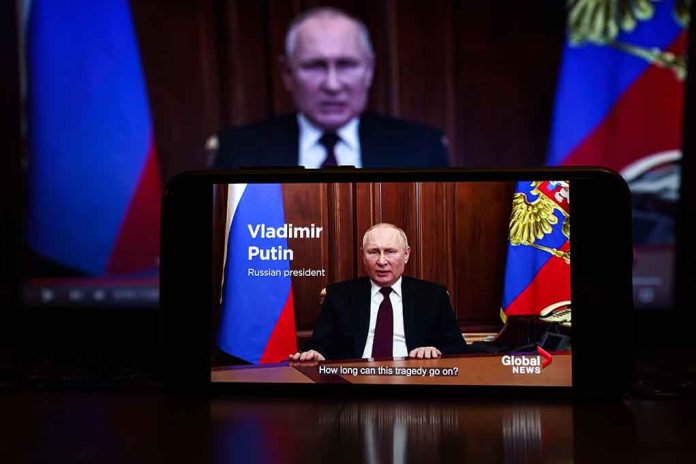
President Putin unexpectedly dismisses Army General Oleg Salyukov, signaling continued instability in Russia’s military leadership amid ongoing operations in Ukraine.
Key Takeaways
- President Vladimir Putin has dismissed General Oleg Salyukov, Russia’s chief of land forces since 2014, without providing specific reasons
- Salyukov, 70, will transition to a deputy role under former Defense Minister Sergei Shoigu, continuing a pattern of military leadership reshuffling
- The dismissal came shortly after Salyukov’s prominent participation in the Victory Day military parade in Moscow
- This change follows numerous defense ministry shake-ups throughout 2023, suggesting ongoing instability in Russia’s military command structure
- The timing coincides with upcoming peace talks with Ukraine in Istanbul, the first direct negotiations in over three years
Putin’s Military Leadership Overhaul Continues
In a move that has sent shockwaves through Russia’s military establishment, President Vladimir Putin has dismissed Army General Oleg Salyukov, the commander of Russia’s ground forces since 2014. The announcement came via a Kremlin decree with no explanation provided for the sudden removal. Salyukov will not be leaving government service entirely, however, as he has been reassigned to serve as a deputy to former Defense Minister Sergei Shoigu, who himself was reassigned from his prominent position last year.
The timing of Salyukov’s dismissal is particularly noteworthy, coming just days after his participation in Russia’s Victory Day military parade in Moscow’s Red Square on May 9th. The annual event, which commemorates the Soviet Union’s victory over Nazi Germany in World War II, is one of Russia’s most significant military ceremonies. That Salyukov was removed so soon after this high-profile appearance suggests the decision may have been abrupt rather than planned Stated Salyukov
Pattern of Military Restructuring
Salyukov’s dismissal is not an isolated incident but rather part of an extensive pattern of leadership changes within Russia’s military and defense establishments. Over the past year, Russian law enforcement has charged more than a dozen military and defense officials with corruption. Perhaps most notably, Sergei Shoigu, a longtime Putin ally who had held top government positions since the 1990s, was downgraded from his position as Defense Minister last year in what appears to be part of a broader restructuring effort.
Despite these significant personnel changes, the Kremlin has consistently denied that recent arrests and dismissals constitute a purge following military setbacks in Ukraine. However, analysts suggest that Putin may be seeking greater battlefield breakthroughs as peace negotiations mediated by the United States progress, with direct talks between Russia and Ukraine scheduled to take place in Istanbul—the first such negotiations in over three years.
Implications for Russia’s Military Effectiveness
Salyukov’s tenure as head of Russia’s land forces spanned nearly a decade, during which he oversaw operations in Syria and, most recently, the prolonged conflict in Ukraine. Initially expected to be a brief “special military operation,” Russia’s campaign in Ukraine has extended over three years with significant casualties. Under Salyukov’s command, Russian forces have recently made slow but steady gains on the battlefield, particularly near Pokrovsk, with recent territorial captures in the Donetsk region.
Military analysts point to a troubling pattern in Putin’s approach to military leadership. There appears to be a preference for loyalty over competence, resulting in a disorganized command structure. The continuous reshuffling of military leadership has caused bureaucratic disorganization and created political risk due to growing dissatisfaction among military generals, potentially undermining Russia’s strategic objectives in Ukraine Stated President Putin
Strategic Timing and Future Implications
The lack of changes within the General Staff has hindered Russia’s ability to learn from battlefield experience and weakened high command authority. The removal of experienced military leaders like Salyukov raises questions about the strategic direction Putin intends to take with Russia’s military operations moving forward. With peace talks on the horizon, this leadership change may be intended to signal Russia’s willingness to adopt new approaches while simultaneously consolidating Putin’s control over the military establishment.
As Russia’s conflict with Ukraine continues into its third year, these leadership changes reflect the challenge Putin faces in balancing political control with military effectiveness. The outcome of this latest restructuring will likely become apparent in the coming months, both on the battlefield and at the negotiating table, as Russia adjusts its military strategies and diplomatic positioning in response to evolving circumstances in the region Stated Olege Salyukov




